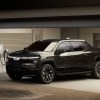
3 Advantages the 2023 Genesis GV60 Has Over the Polestar 2
Genesis, the luxury division of Hyundai, has come into the luxury EV segment with its first offering, the GV60. However, this SUV-ish hatchback isn’t Hyundai’s first EV ever. The GV60 is basically a fancy version of the Hyundai Ioniq 5, which is getting rave reviews among car enthusiasts.
With so many great options on the market, it can seem overwhelming to decide which is the best. One of the GV60’s competitors is the Polestar 2. So, how does the GV60 compare to its luxury EV competition? Here are three advantages the 2023 Genesis GV60 has over the Polestar 2.
1. The 2023 Genesis GV60 has a better warranty

According to Car and Driver, when compared to most other premium automakers, the Genesis brand provides excellent warranty coverage that lasts for a very long time. The Genesis GV60 includes free scheduled maintenance for three years or 36,000 miles, powertrain coverage for up to 10 years or 100,000 miles, and a standard warranty of five years or 60,000 miles.
On the other hand, Car and Driver reports that the Polestar 2 comes with a limited warranty that covers four years or 50,000 miles, electrical components are covered for eight years or 100,000 miles, and there is no complimentary scheduled maintenance.
2. The GV60 is faster
Top Electric SUV reports that the 2023 Genesis GV60 will do 0 to 60 mph in 4.0 seconds. The Advanced AWD version produces 314 horsepower and 446 lb-ft of torque, and the Performance AWD version produces 429 hp and 446 lb-ft of torque. It also has a unique Boost Mode that, for 10 seconds, unlocks more power and torque.
Alternatively, Consumer Reports states that the Polestar 2 will do 0 to 60 mph in 4.4 seconds. All-wheel drive traction is provided by dual front and rear motors. A less expensive (but less powerful) front-wheel-drive, single-motor version is also available. The Polestar 2’s single-motor model uses the same 75.0-kWh battery pack as the dual-motor version, providing 231 hp and 243 lb-ft of torque.
3. The Genesis GV60 has wireless charging capability
Genesis is the first global car company to offer wireless EV charging capability, beginning with the GV60. Genesis announced the start of the wireless EV charging pilot project at three locations in South Korea: Genesis Gangnam, Genesis Suji, and Hyundai Motorstudio Goyang. Every EV charging station at each site has a wireless charger. During the pilot project, it intends to set up approximately 75 wireless chargers across various EV charging locations.
The driver must park the front portion of the GV60 over the EV charging mat to begin wireless charging, similar to how you would charge your phone wirelessly. To develop the technology, Genesis has partnered with WiTricity, a wireless EV charging company with headquarters in the U.S. Genesis could begin mass-market commercialization of the novel convenience feature in 2023 or later if the pilot program is a success.
What this means for consumers is that proprietary charging stations will likely be exclusive to Genesis, which could clear up some congestion at busy Supercharger stations. The Polestar 2 does not offer this option, and there are currently no plans to make this option available.
With so many great options on the EV market now compared to 10 years ago, it’s hard to choose just one. In the end, all EVs have pros and cons. As with any new technology, the next 10 years will bring even better EVs into the automotive landscape.


